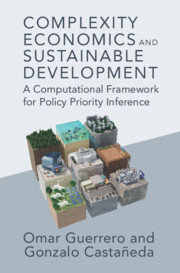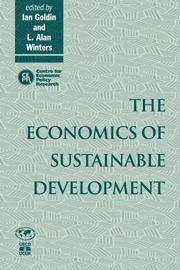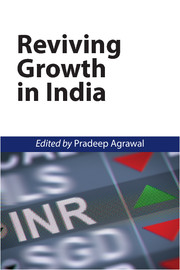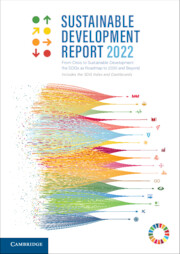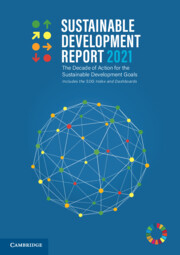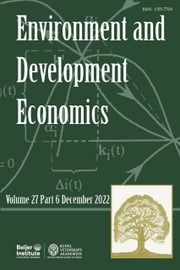Complexity Economics and Sustainable Development
A Computational Framework for Policy Priority Inference
£105.00
- Authors:
- Omar A. Guerrero, The Alan Turing Institute, London
- Gonzalo Castañeda, Centro de Investigación y Docencia Económicas
- Date Published: January 2024
- availability: Available
- format: Hardback
- isbn: 9781316516980
£
105.00
Hardback
Other available formats:
Paperback, eBook
Looking for an inspection copy?
This title is not currently available on inspection
-
The Sustainable Development Goals are global objectives set by the UN. They cover fundamental issues in development such as poverty, education, economic growth, and climate. Despite growing data across policy dimensions, popular statistical approaches offer limited solutions as these datasets are not big or detailed enough to meet their technical requirements. Complexity Economics and Sustainable Development provides a novel framework to handle these challenging features, suggesting that complexity science, agent-based modelling, and computational social science can overcome these limitations. Building on interdisciplinary socioeconomic theory, it provides a new framework to quantify the link between public expenditure and development while accounting for complex interdependencies and public governance. Accompanied by comprehensive data of worldwide development indicators and open-source code, it provides a detailed construction of the analytic toolkit, familiarising readers with a diverse set of empirical applications and drawing policy implications that are insightful to a diverse readership.
Read more- Introduces the reader to the field of computational social science
- Provides the only existing demonstration of full potential of computational social science, from theory to data analysis, to policy prescriptions
- Familiarises the reader with a diverse landscape of analytic frameworks used in sustainable development
- Provides a meticulous guide through the technical details of a novel computational framework and shows the reader how to deploy it for numerous empirical applications
Reviews & endorsements
'The book by Omar Guerrero and Gonzalo Castañeda is a path-breaking contribution that, through a careful validation procedure of the complexity applied to sustainable development, demonstrates the logical and empirical superiority of the complex economy over the mainstream method, tight in the straitjacket of equilibrium. Furthermore, it offers convincing evidence of the need for economic policy intervention in sustainable development.' Mauro Gallegati, Università Politecnica delle Marche, Ancona, Italy
See more reviews'The opportunities afforded by agent-based modelling for informing the development, appraisal, and evaluation of public policies at global and national scales have becoming increasingly evident over the last decade. But often research in this area has been small-scale, not well connected with policymakers, and methodologically unsophisticated. This book is different. It shows in detail the value of modelling using a generative causation approach, develops a powerful modelling framework, and applies it to a range of important case studies to evaluate the effectiveness of allocating budgets to achieve development and sustainability goals, both cross-nationally and at the level of individual countries. It is an excellent example of what policy modelling can achieve.' Nigel Gilbert, Professor of Sociology, Centre for Research in Social Simulation, University of Surrey, UK
'This important book makes excellent contributions on various levels. It introduces readers to sustainable development from a complexity perspective, and provides a masterclass on agent-based modelling and computational economics. Supported by a wealth of empirical data and case studies, the authors address numerous highly relevant topics in sustainability. The book is rich with original insights and policy recommendations. A must-read!' Dietmar Maringer, Professor of Computational Economics and Finance at the University of Basel, Switzerland
Customer reviews
Not yet reviewed
Be the first to review
Review was not posted due to profanity
×Product details
- Date Published: January 2024
- format: Hardback
- isbn: 9781316516980
- length: 420 pages
- dimensions: 235 x 160 x 30 mm
- weight: 0.75kg
- availability: Available
Table of Contents
Part I. A Complexity Approach to Sustainable Development:
1. Introduction
2. Policy prioritisation, complexity, and agent computing
3. Relevant data and empirical challenges
4. A computational model
5. Calibration and validation
Part II. A Global View of Sustainable Development:
6. The feasibility of the sustainable development goals
7. Government spending and structural bottlenecks
8. Public governance and sustainable development
9. The impact of international aid
Part III. A Focalised View of Sustainable Development:
10. Subnational development and fiscal federalism
11. Accelerators and systemic bottlenecks
12. Deprivation, income shocks, and remittances
13. Lessons and reflections.
Sorry, this resource is locked
Please register or sign in to request access. If you are having problems accessing these resources please email [email protected]
Register Sign in» Proceed
You are now leaving the Cambridge University Press website. Your eBook purchase and download will be completed by our partner www.ebooks.com. Please see the permission section of the www.ebooks.com catalogue page for details of the print & copy limits on our eBooks.
Continue ×Are you sure you want to delete your account?
This cannot be undone.
Thank you for your feedback which will help us improve our service.
If you requested a response, we will make sure to get back to you shortly.
×
